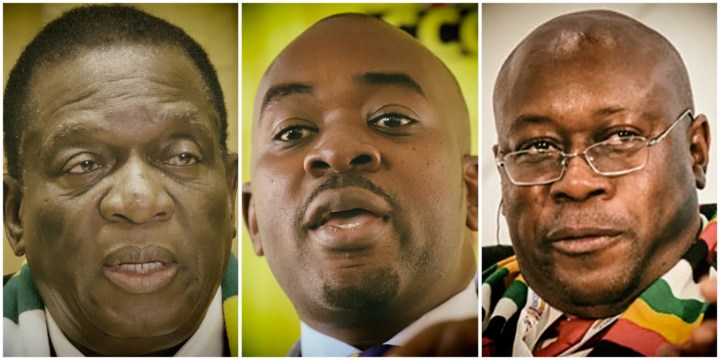
The allegations come in the wake of President Emmerson Mnangagwa issuing a warning to foreigners not to interfere in Zimbabwe’s electoral processes.
“As the people of Zimbabwe we will not allow the West to dictate to us. We don’t … dictate to them, this interference from outside is unacceptable. We as a sovereign state and a member of the United Nations, we have a sovereign right to run our elections [without interference].
“Those countries who want to observe must restrict themselves to the role of observing [and] not interfere. We will not accept it,” said Mnangagwa while commissioning the newly renovated Robert Gabriel Mugabe International Airport.
In previous elections, the Zimbabwean government has always clashed with international observers, who issued reports outlining electoral malpractices, voter intimidation and human rights abuses in the country.
However, the head of the European Union Election Observation Mission, Fabio Massimo Castaldo, pledged the bloc would stick to its mandate while it observes the Zimbabwean elections for the second time after Mnangagwa lifted the ban imposed by his predecessor, the late former president Robert Mugabe, who had always accused the EU of bias against Zanu-PF.
“The deployment of this mission is a strong sign of Zimbabwe and the EU’s commitment to supporting genuine and transparent elections.
“We are here to achieve common goals with the people and the institutions of Zimbabwe. We will observe and analyse elections and our tested methodology ensures that there won’t be any interference in the process by our side,” said Castaldo.
Despite Mnangagwa’s calls for foreigners not to meddle in Zimbabwe’s electoral processes, Zanu-PF’s ally in its fight against Ian Smith’s colonial rule, the Frelimo party of Mozambique, stands accused of interfering in the southern African nation’s upcoming elections.
‘Terror gang’
The CCC parliamentary candidate for the Chipinge South constituency, Clifford Hlatshwayo, accused a Frelimo member only identified as Magarabota of leading a gang that is allegedly terrorising some businesspeople and his party’s members for backing the opposition.
A video that went viral on social media shows Magarabota threatening that Mozambique would cut fuel supplies to Zimbabwe if inhabitants of Chipinge voted for the opposition. Frelimo has said that businesspeople should strongly support Zanu-PF, and if they do not they will die.
Hlatshwayo told his party supporters at Chingove business centre, about 20km from the border between Zimbabwe and Mozambique, that Magarabota was threatening the peace that currently prevailed in the eastern region.
Another opposition member, Reuben Bvunzawabaya, who lives near Hauna Business Centre in Mutasa District, told Daily Maverick that Magarabota’s “terror gang” was threatening violence.
“We have been threatened here by people led by a Mozambican terror gang led by Magarabota of Frelimo.
“They are reminding us of the 2008 violence and we are now afraid that if they execute what they are saying we could lose our loved ones,” said Bvunzawabaya.
Efforts for comment from Frelimo and Magarabota were fruitless at the time of publishing.
In 2008, Zimbabwe experienced an orgy of state-sponsored violence in which hundreds of members of the opposition Movement for Democratic Change, at the time led by former prime minister Morgan Tsvangirai, were killed.
Tsvangirai, who had beaten his rival Robert Mugabe in the first round of voting, but failed to garner enough votes to be declared president, pulled out of the presidential runoff, declaring: “I cannot walk to State House walking over dead bodies.”
Since Mnangagwa proclaimed the date of this year’s elections, several opposition supporters have claimed that they are being targeted by the ruling party.
Are Zimbabwe’s diamonds being looted?
Zanu-PF spokesperson Christopher Mutsvangwa and his party’s information director, Tafadzwa Mugwadi, did not respond to questions sent by Daily Maverick.
However, many locals in Manicaland Province say they are worried that they could lose their natural resources to foreign nationals such as Mozambicans who were now threatening them with violence ahead of the polls. One such person is Nixon Sithole, who lives near the Chiadzwa diamond fields.
“We have seen a lot of foreigners here in Chiadzwa in the company of top Zanu-PF officials; our fear is that they are looting our diamonds and that could be a reason why Frelimo members do not want us to back the opposition.
“Some helicopters are always landing in the diamond fields and perhaps they would be transporting our diamonds to other countries via Mozambique. The helicopters are always seen flying into Mozambique,” said Sithole.
Mines minister Winston Chitando, who is seeking re-election in Masvingo Province, said he was not aware of those claims.
“I am hearing this from you for the first time. All I can say for now is that, as government, we follow laid-down and transparent procedures when it comes to the selling and marketing of all our minerals.
“I am not privy to what you are talking about,” said Chitando.
Mugabe once claimed that Zimbabwe’s treasury lost more than US$15-billion in diamond money because of corruption, but nothing was done to bring perpetrators to account. Mnangagwa, who promised a raft of reforms, including dealing with corruption, when he took over from Mugabe, has failed to deal with corruption in his government, and his critics have accused him of applying a “catch and release” strategy to make it seem as if he was taking action.
Some security sector sources alleged that some resources used to finance the military-assisted transition that caused Mugabe to resign in November 2017 were derived from illegal diamond sales, although this could not be independently verified. DM


